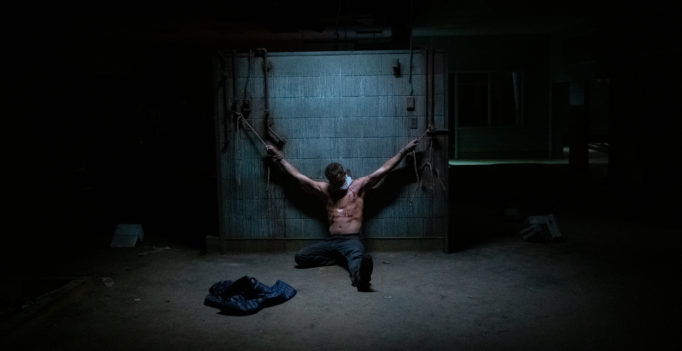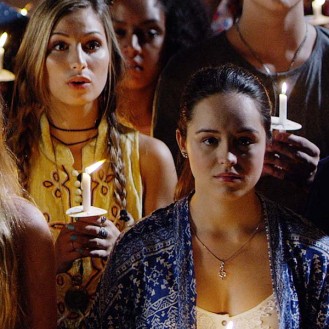By: Trevor Chartrand
Demonic is the most recent directorial effort from District 9’s Neill Blomkamp, and it’s a film that takes a fresh look at an otherwise tired and stale genre – the exorcism movie. Set in a contemporary world, Demonic would seamlessly fit into the Black Mirror series as an ominous cautionary tale of technology and its potential terrors. Rather than robotic military dogs or contact lens cameras though, the dangerous tech in this film is wielded by Vatican priests, and it’s intended to eradicate demons from the possessed.
The film features a disillusioned young woman named Carly (Carly Pope, who appeared briefly in Blomkamp’s Elysium), and her estranged comatose mother, Angela (Nathalie Boltt). Carly is approached by a privatized medical company who requests her assistance with a new type of therapy they have developed for Angela; a dream-sharing helmet that allows them to enter her mind – Inception style. After a series of bizarre circumstances, Carly quickly suspects the doctors are not telling the complete truth. She teams up with an old friend, Martin (Chris William Martin), and together they discover the sinister, ominous nature of the therapy being tested on Angela, as well as its dangerous implications.
Demonic certainly deserves applause for its unique take on the exorcism trope. Eliminating demons with technology is interesting as a premise, but how does that work, exactly? The film fails to define this integral concept well enough for an audience to completely understand. On the one hand, it appears to function by having one character’s subconscious enter another character’s mind, in order to talk to them while they’re in a coma. On the other hand, there’s mention of a virtual reality world that appears to have been built by the doctors – a new world that both characters are transported into. But which way does it work? Or is it a little bit of both? Again, the concept is exciting, but with poor world-building and (dare I say it) a lack of clear exposition, writer/director Blomkamp fails to define how the exorcism is designed to actually function. The suspenseful approach taken by the filmmaker is ominous, sure, but leaves out certain details necessary to make the story work overall.
Too often in horror films, performances are weak at best, thanks in part to unjustified character motivations. Unfortunately, this film is plagued with this common issue, especially when the Carly character chooses to continue assisting the doctors, even once things become dangerous for her. The character has no reason to keep coming back in for more sessions. She has no attachment to her mother, a convicted criminal who Carly hasn’t seen or spoken to in decades. Carly could have easily walked away from the situation, guilt-free. Instead, her sudden, inexplicable desire to help her mom (at great personal cost) does not ever feel properly justified. It’s a classic case of the survivor girl barricading herself in an inescapable basement rather than simply running outside to freedom.
Visually, Demonic is a good-looking film I suppose, with some interesting and memorable cinematography. In the dream/virtual reality world, there is a layer of pixilation superimposed over the characters to establish the incomplete nature of the fragmented mind. A particularly memorable scene features Carly standing on the floor speaking to Angela, who is seated on a chair affixed to the ceiling. There’s a dreamlike quality and notable attention to detail with the development of the world inside the mind. The use of lighting is a tad cliché however, with a great deal of time spent on plot contrivances that make the lights flicker during scary scenes. Evidently, even in the dream world, the lights go out with dramatically-appropriate timing.
Despite the unique concept of ‘technology conquering the devil,’ Demonic does not redefine or revolutionize the genre. The final act of the film is a relatively generic, paint-by-numbers tale of demon purging. The movie certainly earns some accolades for its attempt to bring a fresh approach to an old story, but doesn’t really break new ground overall. Blomkamp’s film is engaging enough for a one-time watch, but ultimately mundane and relatively forgettable.
**********
Do You Tweet? Follow These Tweeple:
Trevor Chartrand: @OhHaiTrebor





Be the first to comment